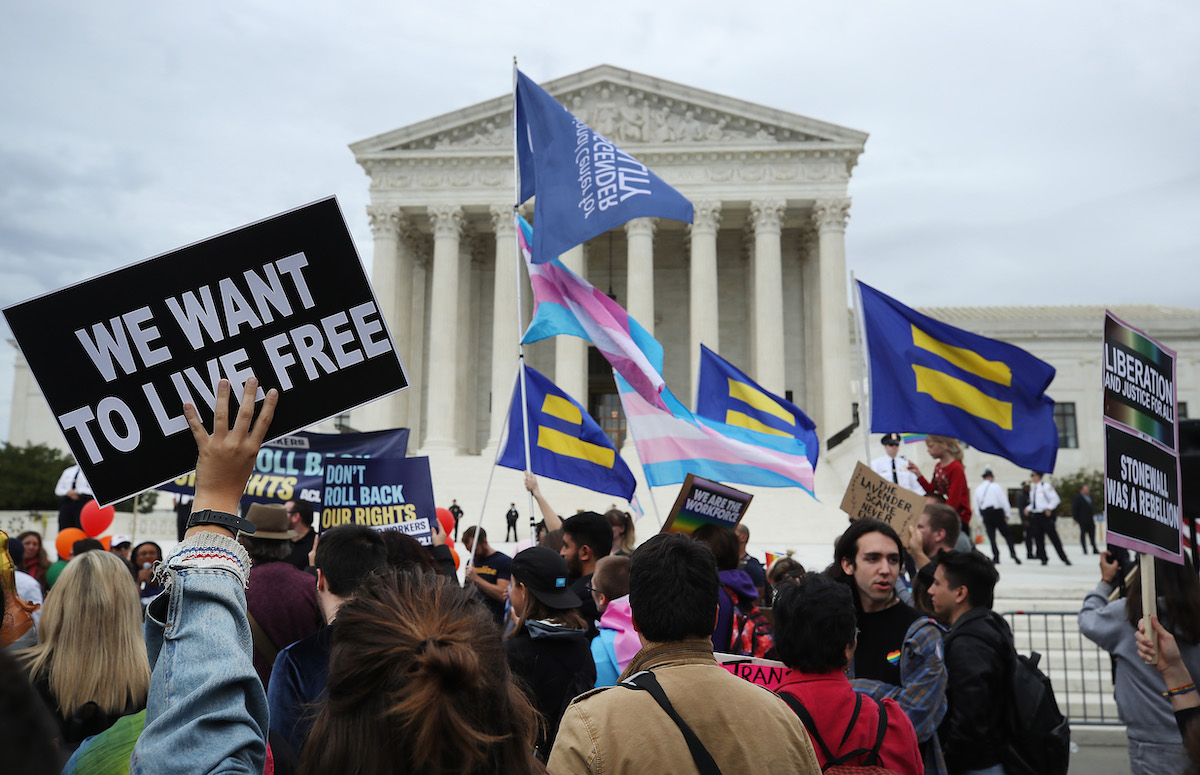Arguments in the Supreme Court LGBT Rights Cases Went in a Surprising Direction
There may be hope for advocates

Advocates for LGBT rights had a big before the Supreme Court last Tuesday when they presented arguments in the cases of Altitude Express Inc. v. Zarda, Bostock v. Clayton County, and R.G. & G.R. Harris Funeral Homes v. EEOC. All three cases concern the scope of Title VII of the Civil Rights Act of 1963. The first two cases (which were consolidated) ask whether Title VII’s prohibition against discrimination because of “sex” applies to sexual orientation, and the the third case asks if the law applies to transgender individuals.
The core of the question in these case is not whether Title VII was intended to apply to LGBT individuals; as even Justice Ruth Bader Ginsburg acknowledged, that was not something congress contemplated when enacting the law at a time when homosexuality was still regarded as a mental illness. Instead the cases ask if there is a way under the text of Title VII for the discrimination here to fall under existing interpretation.
To many of the justices, it comes down to whether or not the actions of the plaintiffs would have resulted in their firings if they were of a different sex … and it was conservative justice and Trump appointee Neil Gorsuch that actually led the way on this questioning.
Gorsuch took the initiative in questioning the attorneys for plaintiffs and defendants, as well solicitor general Noel Francisco who appeared as a “friend of the court” to support the employers. Gorsuch focused on the idea that sex need only be a cause for discrimination, and that by its nature, “sex” encompasses sexual orientation. From SCOTUSblog:
Gorsuch pushed back against Harris’ efforts to distinguish between sex and sexual orientation, pointing to the fact that Title VII only requires sex to be a cause. If Bostock and Zarda were men who liked other men, Gorsuch asked Harris, why wouldn’t that be enough to bring Title VII into play?
Gorsuch, along with others on the court, claims to be a textualist, and this may actually be a good thing when it comes to these cases. Here’s an example of how the logic works: the plaintiff in Zarda was fired from his job because he wanted to have relationships with men. Had he been a woman engaging in the same behavior, he would not have been fired. That equals discrimination caused by his sex, and that line of thinking seems to be what Gorsuch was focused on.
The same logic applied to the Harris Funeral Homes case, where the plaintiff was fired for failing to conform to the stereotypes of her sex as assigned at birth. This case seems even more easily encompassed by the plain language of Title VII, however the justices in their questioning seemed more leery on making that pronouncement.
Gorsuch questioned the attorney for plaintiff in the Harris whether the court should consider the “massive social upheaval” that a ruling for plaintiff would result in and if it should be Congress and not the courts that made this change. However the attorney countered that courts had been hearing such cases and ruling that title VII applied to trans people for 20 years, and it was well within the province of the court to make such a ruling. Attorney also dismissed Justices concerns about how a trans positive ruling would affect other issues, such as dress codes and bathroom use; and against attorney assured the justices that those issues were unrelated.
Overall, the direction of oral argument can give LGBT advocates some reason to be optimistic as they await the court’s ruling—a ruling that may not come until next year. However, even if the court rules against the plaintiffs it is not the end of the fight; it only means that advocates must shift their focus on Congress to pass comprehensive workplace protections for LGBT individuals.
(image: Mark Wilson/Getty Images)
Want more stories like this? Become a subscriber and support the site!
—The Mary Sue has a strict comment policy that forbids, but is not limited to, personal insults toward anyone, hate speech, and trolling.—
Have a tip we should know? tips@themarysue.com